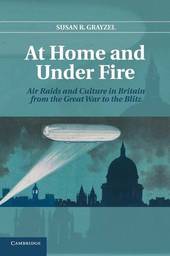
|
At Home and under Fire: Air Raids and Culture in Britain from the Great War to the Blitz
Paperback / softback
Main Details
| Title |
At Home and under Fire: Air Raids and Culture in Britain from the Great War to the Blitz
|
| Authors and Contributors |
By (author) Susan R. Grayzel
|
| Physical Properties |
| Format:Paperback / softback | | Pages:356 | | Dimensions(mm): Height 229,Width 152 |
|
| Category/Genre | British and Irish History
First world war
Second world war |
|---|
| ISBN/Barcode |
9781107679412
|
| Classifications | Dewey:941.082 |
|---|
| Audience | |
|---|
| Illustrations |
15 Halftones, unspecified
|
|
Publishing Details |
| Publisher |
Cambridge University Press
|
| Imprint |
Cambridge University Press
|
| Publication Date |
27 February 2014 |
| Publication Country |
United Kingdom
|
Description
Although the Blitz has come to symbolize the experience of civilians under attack, Germany first launched air raids on Britain at the end of 1914 and continued them during the First World War. With the advent of air warfare, civilians far removed from traditional battle zones became a direct target of war rather than a group shielded from its impact. This is a study of how British civilians experienced and came to terms with aerial warfare during the First and Second World Wars. Memories of the World War I bombings shaped British responses to the various real and imagined war threats of the 1920s and 1930s, including the bombing of civilians during the Spanish Civil War and, ultimately, the Blitz itself. The processes by which different constituent bodies of the British nation responded to the arrival of air power reveal the particular role that gender played in defining civilian participation in modern war.
Author Biography
Susan Grayzel is the author of Women's Identities at War: Gender, Motherhood, and Politics in Britain and France during the First World War (1999), which was awarded the 2000 British Council Prize of the North American Conference of British Studies, and Women and the First World War (2002). She co-edited Gender, Labor, War and Empire: Essays on Modern Britain with Philippa Levine, published in 2009. Currently, Grayzel is a Professor of History at the University of Mississippi.
Reviews'Professor Grayzel shows that in order to understand the real impact of the Blitz, it is important to go back a quarter of a century to the first aerial assault on Britain. Drawing on a vast range of sources and utilizing the theoretical sophistication of a historian at the height of her powers, At Home and Under Fire also manages to make us recognize once more the unprecedented shock of death from above and engages our sympathy with the people first caught under the bombs.' Dr Adrian Gregory, University of Oxford 'Throughout the twentieth century, and into the twenty-first, civilians have been the subject of aerial bombardment as combatant nations and groups have sought to win conflicts by inflicting death and injury on those at home 'behind the lines'. In this riveting study Susan Grayzel traces the origins of this all-too-familiar form of warfare back to the early twentieth century, showing the impact of aerial warfare on the home and on those within. Exploring the responses to this new threat to personal and national security from the state, the media, and individuals, this is truly a book for our times.' Lucy Noakes, University of Brighton 'At Home and Under Fire is an exhaustively researched and illuminating analysis of the impact of air warfare on Britain in the twentieth century. Grayzel thoughtfully analyzes the political and cultural responses to and consequences of the bombing in World War I, examining the policy and public debates at the time and in the war's aftermath. She clearly demonstrates how weapons from the skies used against British civilians beginning in 1914 shaped interwar debates about controlling war, protecting civilian lives, and preparing for the war to come, and how these, in turn, informed responses to the massive attacks from the air in World War II. The book significantly enriches our understanding of the nature and consequences of 'Total War'.' Sonya O. Rose, Professor Emerita, University of Michigan 'Susan Grayzel now offers a wider perspective on the impact of the bombing of civilians, by explaining the ways in which everyday life was first 'militarized' by the attacks in the First World War. [She] effectively illustrates how the extension of the scale of conflict significantly affected the British people's attitude to the state, and how they subsequently became far more tolerant of its intervention in their daily lives.' Ian Cawood, The Times Literary Supplement '[Grayzel's] book is a major achievement, providing us with a complexly argued and exhaustively researched account of British responses to the threat of aerial attack, one that illuminates the vital role of gender in how war was imagined and anticipated.' Geoffrey Field, Twentieth Century British History 'Because of German attacks it was Britain that first had to cope with 'total war' and this book will greatly aid our understanding of how this important development occurred.' Contemporary Review 'This detailed, well-written book chronicles the cultural transformation wrought by the air raid, in reality and in the British imagination, between the early Zeppelin raids of the First World War and the end of the Blitz in the Second ... This is an exemplary monograph: deeply researched, attentive to the production and reception of culture, and elegantly argued. Its main claim is convincing, and its de-emphasizing of the uniqueness of the reaction to the Blitz is important.' Journal of British Studies
|